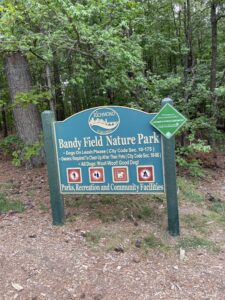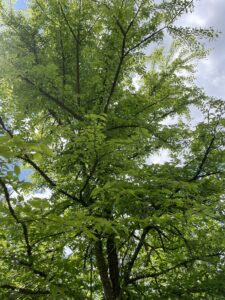Participating in the invasive species removal at Bandy Field on Saturday, April 25 challenged and expanded my existing knowledge on both how invasive species operate and the importance of removing them. Prior to this experience, and especially prior to taking this class, I knew on an abstract level that invasive species were a negative for ecosystems, but I always assumed that this was simply for aesthetic or perceptive reasons. I also had not thought deeply about the varied impact that invasive species’ may have on different native plants and animals. However, on Saturday I learned about the ways that English ivy, one of the most common invasive species in Virginia and on the East Coast generally, crowds out native plants and effectively suffocates trees through competing with them for water, blocking out some sunlight through its dense leaves, and weakening their branches. Generally, I also learned that for invasive species to succeed, they have to have characteristics like the English ivy that allow them to outcompete and kill off native species. Put into that context, the invasive species removal was a meaningful and thought-provoking experience, and at its completion I felt like I had contributed an important service to the native fauna and flora at Bandy Field. We were largely focused on the removal of English ivy, and while I knew before this experience that it was a common invasive species, I was still surprised by how prevalent it was in all aspects of the wooded areas of the site (e.g. on trees, spreading on the ground, and overtaking smaller plants). It seems to spread quickly once it is introduced and create a strong foothold from which to do harm in any ecosystem. I hope that others can have similar experiences to the point where society as a whole recognizes the dangers posed by invasive species, especially the English ivy, and takes steps to eliminate it, not only in public spaces like Bandy Field and park locations along the James River, but also are encouraged to eliminate invasive species from their own contexts (e.g. their yards).


